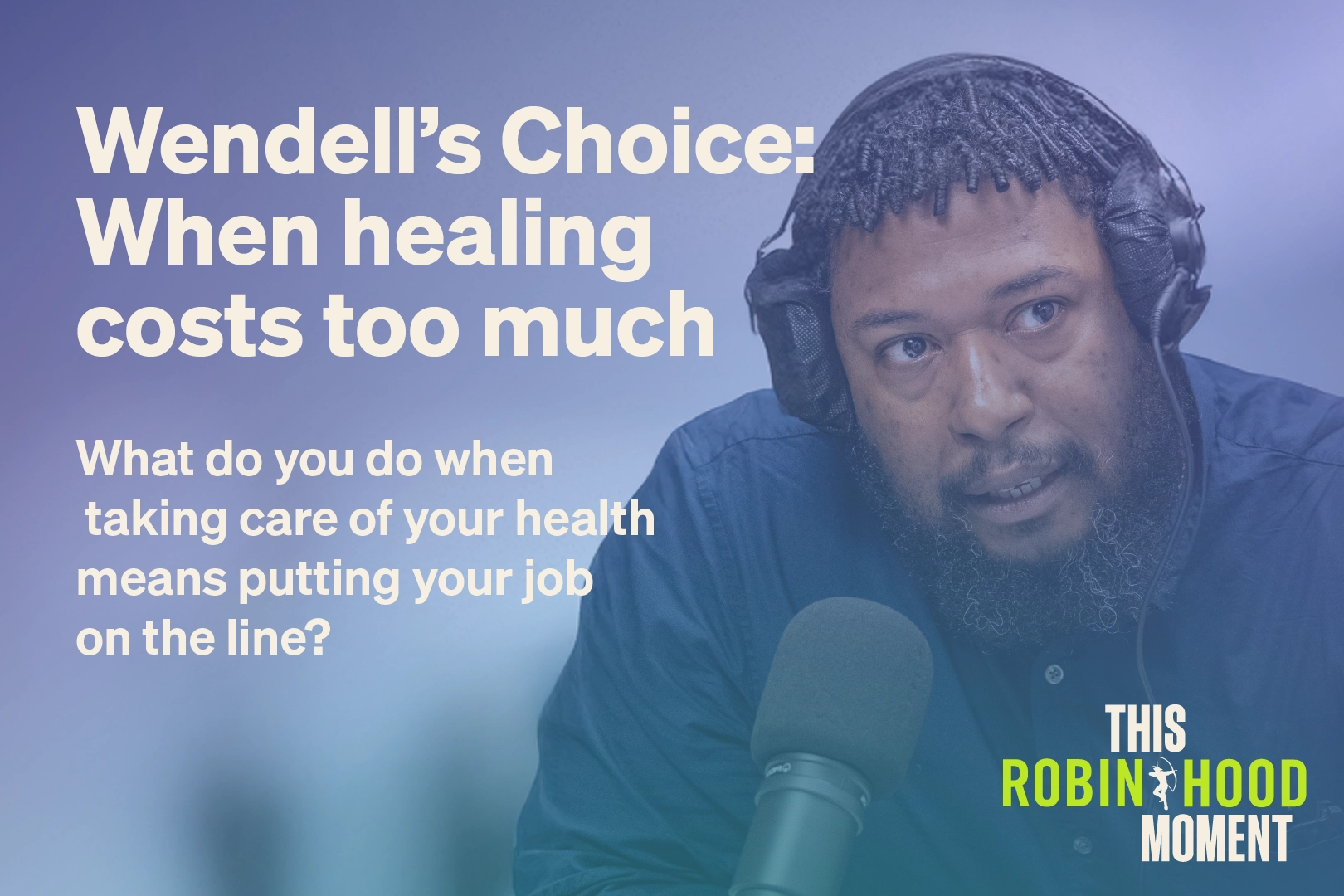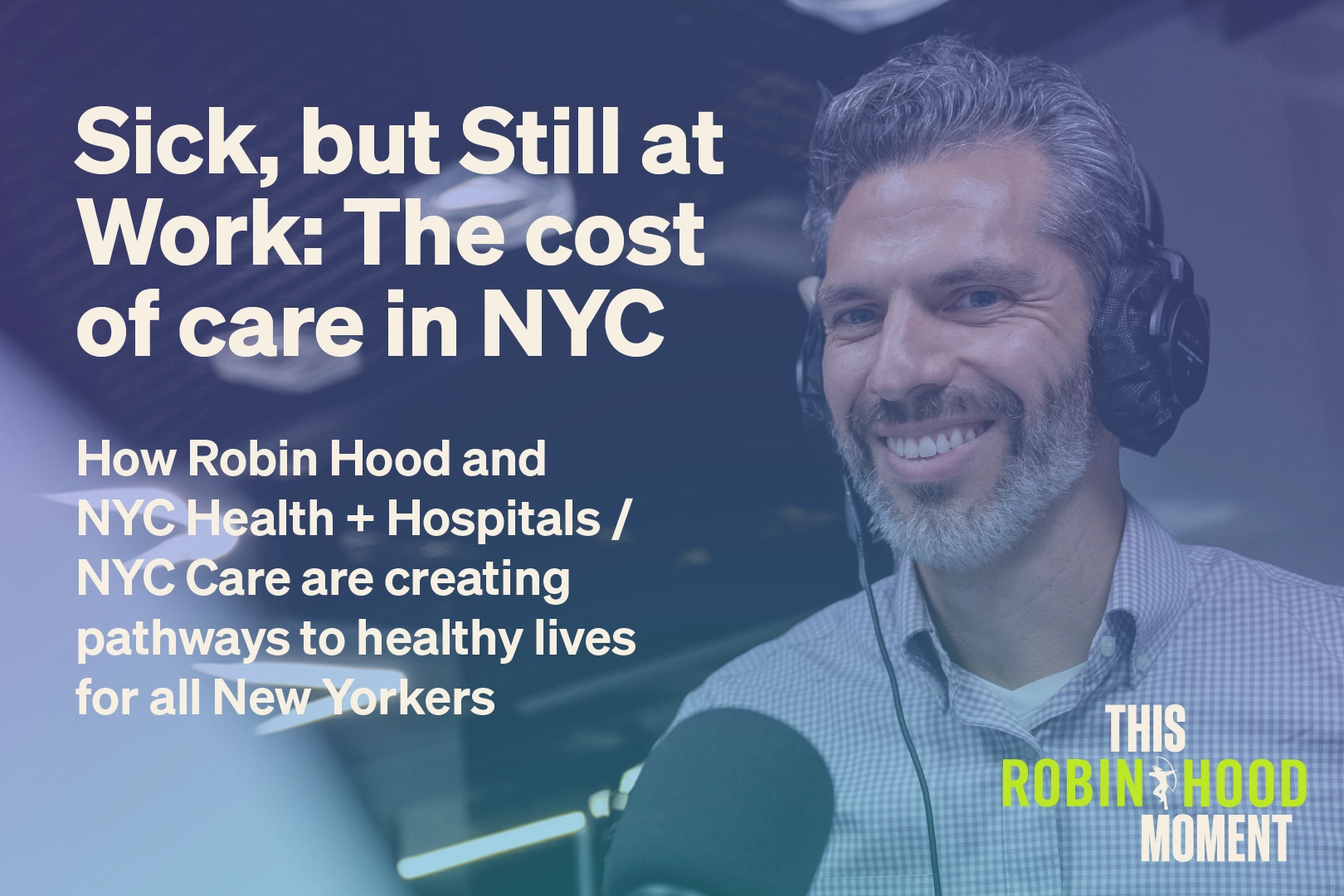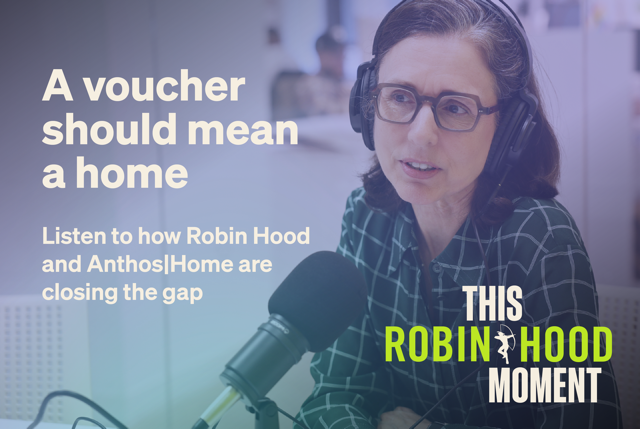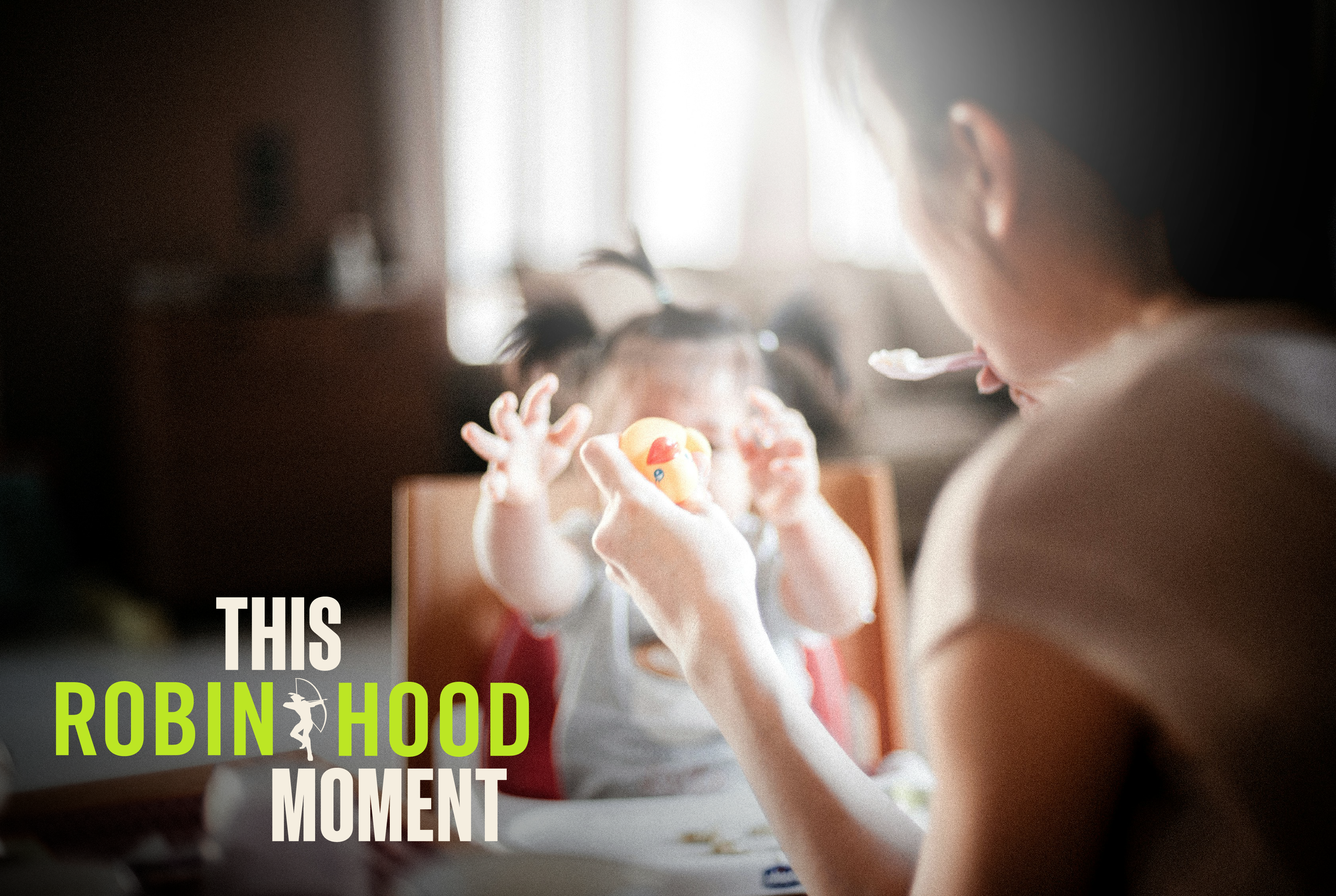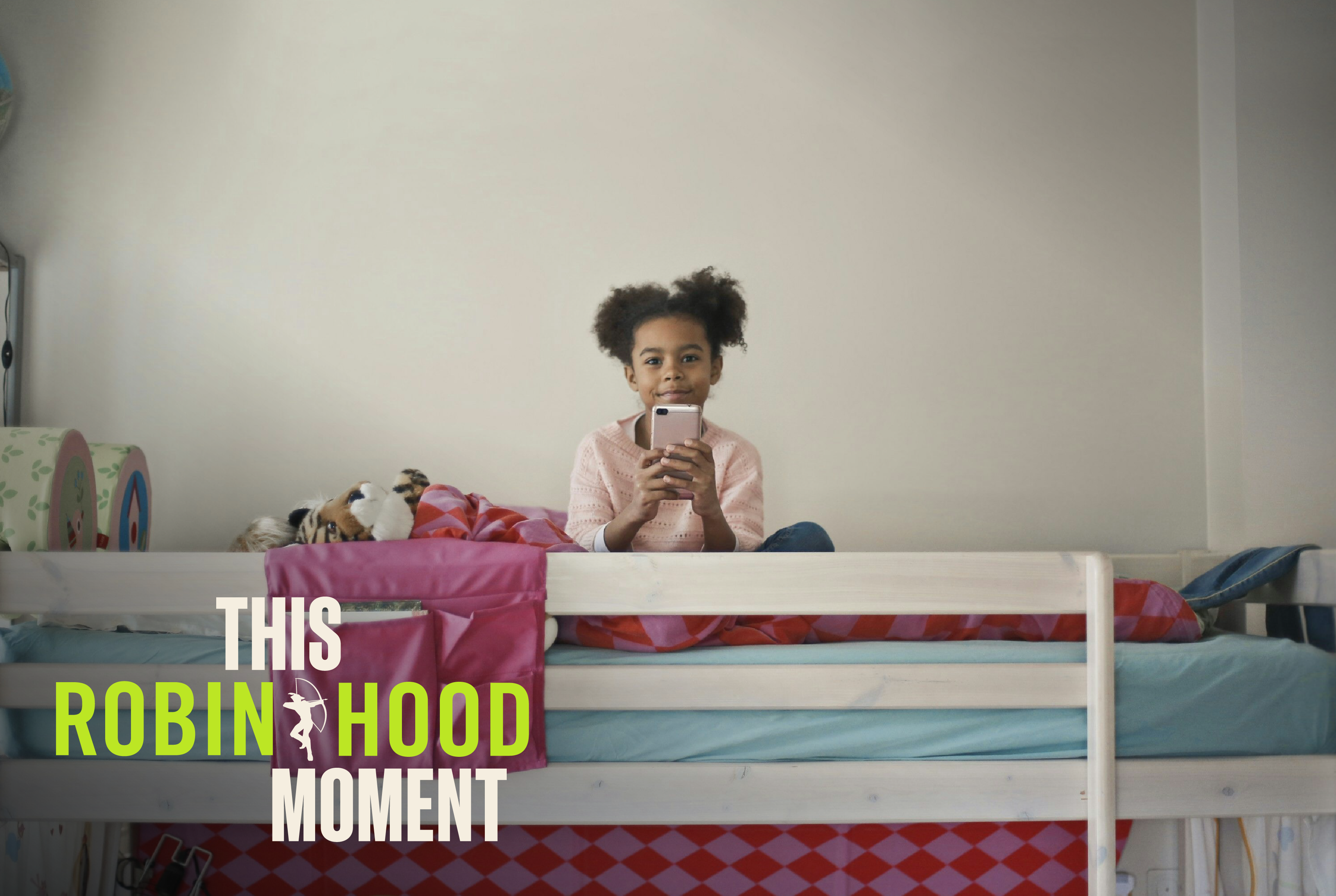Oct 09, 2025
Wendell’s Choice: When healing costs too much (Bonus Episode) | This Robin Hood Moment
What happens when getting better costs more than getting by? In this bonus episode of "This Robin Hood Moment," we meet Wendell, a Bronx resident living with chronic illness who must choose between his paycheck and his health — a stark example of New York City’s “cost of choice.”
Listen and Subscribe: Apple Podcasts | Spotify | iHeart | YouTube
What do you do when taking care of your health means putting your job on the line?
For Wendell, who lives in Brooklyn, getting sick came with a price he couldn’t afford. Without paid sick leave, every doctor’s visit meant lost wages—and the risk of falling behind on rent and bills. The result: a cycle of exhaustion, illness, and work that feels impossible to break.
In this episode, Wendell shares his story of pushing through pain, navigating the city’s healthcare maze, and learning how to advocate for himself along the way. His story of becoming a NYC Care member captures the quiet courage of New Yorkers who keep the city moving while struggling to care for themselves in a system where healing too often comes at a cost.
Thoughts? Guest suggestions? Email us at info@robinhood.org.
“This Robin Hood Moment” is hosted by Kevin Thompson and Crystal Cooper. The show is produced and edited by Cory Winter, with graphic design by Mary Power. Additional motion graphics and footage are provided by Motion Array. Our theme music is from Epidemic Sound.
The views and opinions expressed by external podcast speakers and guests are solely their own and do not reflect the opinions of Robin Hood or its personnel, nor does Robin Hood advocate or endorse any individuals or entities featured on the episodes.
TRANSCRIPT
This transcript was prepared by a transcription service. This version may not be in its final form and may be updated.
Cory Winter: What happens when the cost of getting care collides with the cost of living?
For many New Yorkers, the choice between going to the doctor and making rent, buying groceries, or paying down debt isn’t theoretical. It’s daily. And it’s devastating.
This bonus episode of “This Robin Hood Moment” hits a bit differently from our usual interview format. Today, you’ll hear a story. A story told mostly in one New Yorker’s own words, woven together with the bigger forces shaping life in this city.
It begins at a birthday dinner. A moment of joy that suddenly turned into a moment of crisis.
This is Wendell’s story.
Cory Winter: Wendell grew up in Brooklyn, raised in a West Indian family where health and fitness were part of everyday life. He was the guy always in shape, always moving, always in control of his body. That identity carried him into adulthood. Which is why what happened on his 42nd birthday came as such a shock.
Wendell: So basically I grew up in Brooklyn, New York, my family, typical family dad was around for a while, you know, paid child support, took care of us, but mom was, you know, the overall backbone, and I, I do have an older brother who I guess who became my father figure and who really got me into this is why this whole diabetes thing is crazy because ever since I was very young for my brother, I was always working out, I was always in shape.
Always into sports and you know, mom was never the type to, you know, again, being from the West Indies, we were more like okra and saltfish and baccalau and we weren’t really into the burgers and fries and the milkshakes, you know, we, we kept our traditions home that’s what we knew, that’s what our traditions were food wise.
And going to school, again, you know, mom was the type that prepared lunch and prepared breakfast, and we were never the kids that were going to Burger King afterwards or eating sloppy Joe’s.
We were always really fit and and just really mentally and health wise and spiritually conscious, just about cause that’s how we grew up, that’s how that’s, that’s just typical West Indian culture.
Cory Winter: At his cousin’s house, gathered around food and family, Wendell started to feel… off.
Wendell: That was, I believe, on my 42nd birthday. You know, when you have a hangover and you, you can still function, this, this, this was not normal. I, I, it was either go to dinner or go to the hospital because something was not clicking with me, man. I was, I was. Dizzy, I was, I was nauseous. I was vomiting a lot. I was like, just the trembles, you know, I was like I was literally shaking, you know, and I, I, I, I couldn’t figure it out.
I mean, yeah, it was my birthday weekend, so I mean, I did some partying, you know, as far as, you know, I never felt like that in my life and my, and I, I just wanted to stay home for my birthday. My wife was like, I think you might be a diabetic. I was like, oh hell no! I, I work out too much. I got no, no, nobody in my family is a diabetic, so cause that’s what I’m always thinking it’s, it’s, it’s generational. If my dad has it because my dad was not diagnosed as a diabetic until he was in his 70s.So where is that even coming from? That makes no sense to me.
So I’m like, yeah, it definitely can’t be that. It must just be a bad hangover and then it just so happens that my mother-in-law doesn’t live too far and she has all of, I guess the glucose monitors and the glucose testers, and my wife was like, I bet you you’re a diabetic.
And again, I, it just, it just couldn’t, to me that sounds like a death sentence. I went, checked my glucose, dude, it was like 350.
Cory Winter: 350. Normal is less than 140. Wendell’s blood sugar wasn’t just high—it was life-threatening. In that moment, everything shifted. The body he thought he knew had betrayed him. And suddenly, the future was uncertain.
Wendell: But 350 to me, that sounded like I was about to die. I was like, Yo, this is horrible. I was, I was just like, I don’t have health insurance. You know, I mean, I get paid decent, but we don’t have health insurance and that was, that was, that was the scary part right there.
Cory Winter: A diagnosis like this doesn’t just trigger fear of the illness itself. It triggers fear of what comes next. For Wendell, it was the fear of bills, of bankruptcy, of survival in a city where health insurance is a privilege, not a guarantee.
The next day, Wendell went to NYC Health + Hospitals/Gotham Health, Cumberland. But even then, the math of poverty and precarity ran through his mind.
Wendell: My wife, we went to the hospital the next day and, you know, we told him like yeah I think my husband’s a diabetic and I was literally in tears because again every black person or Latino person I know who who contracted something like that, their quality of life totally disintegrated, you know, and it was none of that seemed to be feasible anymore.
I’m just thinking damn, I’m just gonna be taking medication and you know what it is too. I’ll give you an example. I take metformin right now, I take metformin 1000 mg through NYC care, I roughly pay $2. You know, when if I had like Medicaid or Blue Shield or something, I’d probably have to pay $50.
And in New York, that makes a lot of a difference, you know, that makes a huge difference. Rent is already like $2500. Transportation, I mean, to get a metro card every month, that’s already like $300. I mean $150. I’m exaggerating, $150. Your, your food, just, just the regular food that you’re eating is like $200. So, and then of course you wanna take your wife out sometimes, you still wanna be human.
So I mean that made all the difference in the world to me, you know, I’m here, I’m paying taxes, I’m a good person and I want to be a constructive person and add to society, and I just want my health back, man.
Cory Winter: This is what we call the cost of choice. For Wendell, going to the hospital wasn’t simply about health. It was about deciding which bill not to pay, which debt to let grow, which risk to take. In a city where millions are rent-burdened and thousands live without insurance, healthcare isn’t just medicine—it’s math.
But that day at “Gotham Health, Cumberland,” the math changed. He met Dr. Jonathan Jiménez who told him about a program designed for New Yorkers like him: NYC Care.
Wendell: And that’s when I met the great Doctor Jimenez. Changed changed my life, literally changed my life. I was literally in tears.
He was like, you know, have you heard of NYC Care? And I’m like, no, what are you talking about? You know, I’m like, what’s the difference? What’s the difference between that and Medicaid? And he said, well, first of all, this is just a more cost effective way to get medication and to see a doctor, which I think people can’t get that misconstrued it. NYC care it just makes everything very cost effective.
Cory Winter: It wasn’t a cure. But it was hope. A way forward that didn’t force Wendell to choose between his health and his home.
Through NYC Health + Hospitals, Wendell was referred to NYC Care. That’s where he met his newfound friend, Dr. Jonathan Jiménez.
Wendell: The first time I met Doctor Jimenez, it was just like a doctor. He told me, yeah, yeah, dude, you’re a diabetic. All right, bet, but he’s like, you know what, here’s my number, man. You seem like you’re having a hard time with this. Here’s my number, and this is what you have to do. This is the regimen you’re gonna have to take from now on, and that, that really helped me a lot because your self-esteem just gets shattered.
Now I’m, I’m insulin, I’m not, well I’m taking pills now. I never took, but besides vitamins, I’ve never taken any medication, not even, not even an aspirin, you know, I mean, when you come from, again, you come from a Caribbean culture, that’s, that’s like a no no, you know, that’s like, that’s western life. You let them handle that. We don’t take aspirin pills, you just deal with it, you drink water. That’s it. You have a headache, drink water. Yeah, yeah, you feel sick, drink water, you know.
So it was great to have someone that I could confide in and be like, yo, dude.
Cory Winter: For Wendell, that consultation was more than medical advice—it was a lifeline. Dr. Jiménez didn’t just hand him a prescription. He sat with him, broke down what was happening inside his body, and explained what could happen if changes weren’t made. He gave Wendell a plan, but more importantly, he gave him agency.
Wendell: So I went to Cumberland and I met Doctor Jimenez and honestly, he made it easy, you know, and he, he understood, like, look, we’re not, we’re not rich people and we’re people that made mistakes and physically hurt ourselves, but When I was diagnosed, my blood sugar, my, my A1C was 15. 15! That’s really not good.That’s like bad, like beyond bad. And with the help of Doctor Jimenez, I dropped it down to a 6.0 in 5 months.
I, I think it’s, it’s great to know that someone really cares, and he’s a godsend, man, and not just just that NYC care in general, it’s like that it’s a godsend, you know, it it it makes it makes people feel like we’re not ostracized. It makes people feel like, yo, I don’t just have to sit here with this ailment and and and live a horrible life until I croak, you know, to provide hope for the hopeless, I would, I don’t know, man, I wouldn’t be here today.
I know for a fact I wouldn’t be here today.
Cory Winter: Control. Hope. Those are the words that poverty often robs from people. And yet, with the right care and the right support, Wendell reclaimed them both.
But what Wendell talks about most isn’t the medication or the diet. It’s the people.
Wendell: So, Doctor Jimenez really helped me to, to, to take a grasp on this and show me that life was not over and, and you know what, he became a friend, man.
You know, there’s, he was really somebody I could have confided in and really talked to, and he checked up on me and put me on a constant regimen of coming to the doc, coming to the hospital once, maybe like once a month, 2 times a month, but even besides that, you know, he, he hooks you up with a nutritionist.
So, big ups to Michelle Johnson, my nutritionist. I love you so much. Thank you so much. Well, the best ever. She’s amazing. You, you really have to have a team behind you, like when you’re a diabetic, or you, you, you’re just not gonna figure this thing out, you’re just not, you know. So she just taught me about the, the proper way of eating, the proper way of eating three basic meals a day, you know, and, and what your body can take and what your body doesn’t need.
I, I’ve never seen, you know what NYC Care is? NYC Care is the “Cheers” of the health industry. Everybody knows your name. You go in there, you from, from the receptionist to the security guard, to the, the, the, the woman taking your taking your, your, your, your basic stats, everyone knows your name, everyone remembers you, everyone makes you feel at home.
It’s really a, you know, it’s, you know, when you have a doctor’s appointment, you’re like, what can I do to blow this off? You know, I look forward to going there because there’s people there that care about me. They literally care about you.
Cory Winter: Behind every program, every statistic, are these human moments. A nurse remembering your name. A doctor calling to check in. A system that sees you not as a number, but as a person. For Wendell, dignity was just as important as insulin. And it’s dignity that too often gets stripped away from low-income New Yorkers navigating systems built to exclude.
Wendell’s journey didn’t end with his own recovery. Once he found stability, he began spreading the word—turning his story into an invitation for others.
Wendell: And I wish that this program was in every state, you know, I think it would make a huge, a huge change for people in every state, man, because…
I tell you, I know a quick story. I have a friend that I recommended to NYC care. She’s got two kids, right, and her son has had a constant ear infection. So just thinking he’s young, it’s, it’s an ear infection, you know, you know, and I said, listen, you have to go to NYC care. I said, dude, where else am I gonna go? I can’t afford any of this. You have to go to NYC care. They are going to help you.
She’s like, Dell, can you come with me? I was like, yeah, I’ll come with you. I know what it’s like to have a young mother. I know it’s like to have a mother who doesn’t know everything that’s going on, and if I got a little bit of knowledge that I could share, it’s it’s my duty, you know.
So thank God that we acted when we acted because we went to Cumberland, they, they, they, they went in, they took a look at his son, he, he had such a bad ear infection, he was gonna lose his hearing. I mean this could have just changed his entire life. And you know, she’s like Dell, you saved my life. I was like, no, NYC Care saved your son’s life. It wasn’t me. I just showed you where to go.
Another misconception. My buddy, my buddy, he’s a, he’s a bartender, bouncer, and in a very established club in the city, but he’s also into kickboxing. So it happens he got one roundhouse kick to the brain and looked like he was a little concussed, big scar on his face and he’s like, dude, I’m like, what’s wrong with you? Why do you still have this damn scar on your face?
Dude, I can’t go to no hospital, you know, I can’t afford to see a doctor. I was like, dude, NYC Care. He’s like dude, I don’t wanna go by myself. Can you come with me? I don’t know.
I went with him. Got the recommendation from the doctor to go to Wood Hall to get the stitches put in and get himself taken care of and get the proper medication. So again, NYC Care.
You know, I, I look at, I look at my, my buddy, my buddy who’s got bad chronic back pains, the stigma is everybody thinks you have to spend so much money to get decent health care.
And again, this is just a doctor that’s going to see you at a very cost effective price, probably that’s cheaper than you can imagine and it’s gonna give you the recommendation to go to the other hospital, and you know what?
That’s, that’s basically, that’s the starting point, that’s what you need.
That’s what you need and NYC Care, like the doctors are gonna evaluate you, they’re gonna give you proper pain medication and they’re gonna set you up with Wood Hall or whatever is the adjacent hospital for you to get seen by a proper professional and taken care of. And who else does that? Who else does that?
Cory Winter: Wendell became a messenger—not because he wanted to, but because he had to. He knew what it was like to make impossible choices. And he didn’t want others to face them alone. His story rippled outward, turning one man’s survival into a community’s safety net.
Wendell’s story is about more than a diagnosis. It’s about what happens when the system bends toward dignity. When programs like NYC Care step in to give people the power to choose health without losing everything else.
But it’s also about the bigger question: what kind of city are we building? A city where getting sick means risking your home, your work, your children’s future? Or a city where health is treated as a right, not a privilege?
This is the cost of choice. And Wendell’s story shows us what happens when the balance tips—not toward despair, but toward hope.
Because no one should have to choose between their health and their life.
Cory Winter: Thanks so much for spending time with us on this special bonus episode of This Robin Hood Moment. If you haven’t yet, I really encourage you to check out the companion episode, “Sick, but Still at Work.” In that episode, our hosts Kevin Thompson and Crystal Cooper speak with Dr. Jonathan Jiménez, who leads NYC Care at NYC Health + Hospitals. It’s an eye-opening conversation about what it means when going to the doctor comes at the cost of your paycheck or your rent—and how programs like NYC Care are making healthcare a reality for over 100,000 New Yorkers.
I’m Cory Winter. I want to thank Kevin and Crystal for their editorial support, and Mary Power for the graphics that help bring these stories to life.
And above all, I’m grateful to Wendell for sharing his journey so openly. His story is a reminder of what’s at stake, and of what’s possible.
Thanks again for listening, and for being part of this conversation.
